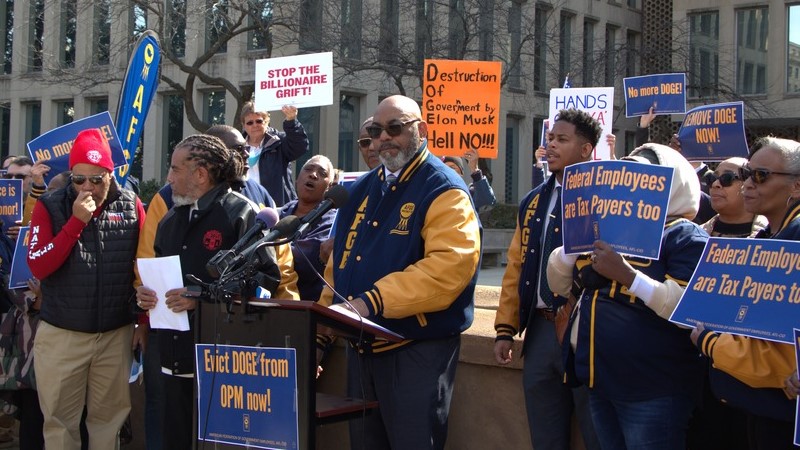
An executive order signed by President Donald Trump and issued by the White House late Thursday aims to end collective bargaining with Federal government unions for vast swaths of the civilian workforce.
This includes all cabinet-level Federal agency chief information officer (CIO) offices and substantial portions of 20 large agencies and component organizations.
The March 27 order says that it is “using authority granted by the Civil Service Reform Act of 1978 (CSRA) to end collective bargaining with Federal unions” at numerous agencies that perform “national security missions.”
“President Trump is taking action to ensure that agencies vital to national security can execute their missions without delay and protect the American people,” the White House said, adding, “the President needs a responsive and accountable civil service to protect our national security.”
The White House also claimed that “certain Federal unions have declared war on President Trump’s agenda,” and that the “largest Federal union describes itself as ‘fighting back’ against Trump. It is widely filing grievances to block Trump policies.”
“President Trump supports constructive partnerships with unions who work with him; he will not tolerate mass obstruction that jeopardizes his ability to manage agencies with vital national security missions,” the White House said.
Among the agencies listed in whole as being covered by the order are: the departments of Defense, Veterans Affairs, State, Treasury, the National Science Foundation, and the General Services Administration; major components of the Department of Homeland Security, including the Cybersecurity and Infrastructure Security Agency; and portions of the Energy Department, Nuclear Regulatory Commission, Environmental Protection Agency, and Justice Department.
Specifically exempted from the order are police and fire fighting organizations.
CIO Office Impact
On the technology front, the order pays particular attention to the offices that run larger Federal agency IT systems.
According to a fact sheet released by the White House – and under the heading of “cybersecurity” – the list of organizations for which collective bargaining with Federal unions is being ended includes the “Office of the Chief Information Officer in each cabinet-level department, as well as DHS’s Cybersecurity and Infrastructure Security Agency, the Federal Communications Commission (FCC), and the General Services Administration (GSA).”
GSA is being included on that list, the White House said, because the agency “provides cybersecurity related services to agencies and ensures they do not use compromised telecommunications products.”
The text of the order also appears to cover CIO offices at the Social Security Administration and the Office of Personnel Management.
The cabinet-level agency CIO shops covered by the order are those defined in section 101 of title 5 of the United States Code. Those include the departments of State, Treasury, Defense, Justice, Interior, Agriculture, Commerce, Labor, Health and Human Services, Housing and Urban Development, Transportation, Energy, Education, Veterans Affairs, and Homeland Security.
In addition to CIO offices at those agencies, the order specifies that it applies to those agencies regarding “any other agency or subdivision that has information resources management duties as the agency or subdivision’s primary duty.”
It’s not immediately clear how many union-represented employees work in larger Federal CIO offices. One knowledgeable source reckoned that for some of those agencies the workforce may run into several hundred people – with a few headcounts running much higher than that – but that union membership may not equal a majority share of CIO office staffs, and in some cases not even close to that.
Union Response
Everett Kelley, who is president of the American Federation of Government Employees (AFGE) that represents about 750,000 Federal employees, said the union is “preparing immediate legal action” in response to the executive order, and blasted the White House action in a statement issued today.
“President Trump’s latest executive order is a disgraceful and retaliatory attack on the rights of hundreds of thousands of patriotic American civil servants – nearly one-third of whom are veterans – simply because they are members of a union that stands up to his harmful policies,” Kelley said.
“This administration’s bullying tactics represent a clear threat not just to federal employees and their unions, but to every American who values democracy and the freedoms of speech and association,” he said. “Trump’s threat to unions and working people across America is clear: fall in line or else.”
Kelley emphasized, “These threats will not work. Americans will not be intimidated or silenced. AFGE isn’t going anywhere. Our members have bravely served this nation, often putting themselves in harm’s way, and they deserve far better than this blatant attempt at political punishment.”
Hill Response
Reps. Gerry Connolly, D-Va., ranking member of the House Oversight and Reform Committee, and Bobby Scott, D-Va., ranking member of the House Education and Workforce Committee, decried the executive order today.
“This executive order is another example of the Trump-Musk Administration’s war on working people,” the congressmen said. “These two billionaires busted unions in their day jobs and now they’re bringing these same attacks to our government in the biggest presidential attack on unions in history.”
“Since the enactment of the National Labor Relations Act nearly 90 years ago, workers have been empowered to come together and form unions to win higher pay, better safety standards, and claim a voice in their workplaces as they protect workers from abuse and misuse by unscrupulous employers,” they said.
“President Trump’s brazen attempt to strip the majority of federal employees of their union rights robs these workers of their hard-fought protections,” the House member said. “This will only give Elon Musk more power to dismantle the people’s government with as little resistance from dedicated civil servants as possible—further weakening the federal government’s ability to serve the American people.”
